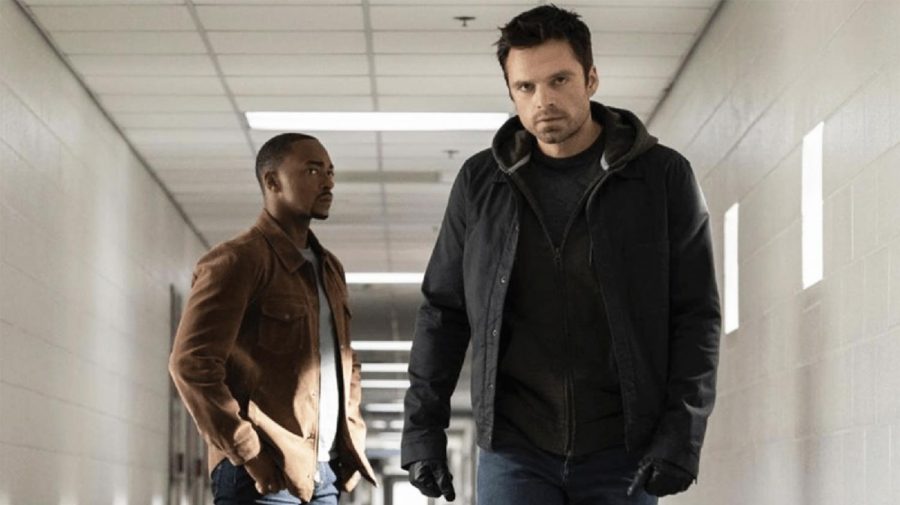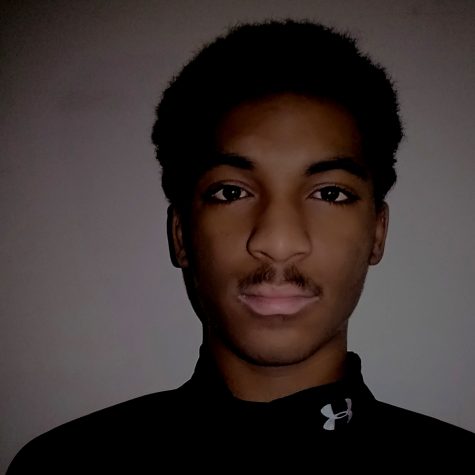Falcon and The Winter Soldier Review
Anthony Mackie’s Sam Wilson stands behind and looks with doubt at Sebastian Stan’s “Bucky” Barnes as he walks to talk to the man who brainwashed him in The Falcon and The Winter Episode 3 “Power Broker.” Photo courtesy of Disney
May 19, 2021
Kari Skogland’s The Falcon and The Winter Soldier focuses on emotion rather than just action, as the spirit and conflict of both Sam Wilson and “Bucky” Barnes remained consistent. The show was a way for the director to reflect and engage in bigger, less comfortable conversations on current events and contemporary issues. The content of the show relates to our real world by mostly tackling the issues of race in America. This review’s point of view is to analyze the show and its message, and it could help bring to light some issues the ERHS community may not know about.
Chris Evans’ Steve Rogers was just physically weak until he was enhanced to the peak of human perfection by the experimental super-soldier serum after joining the military to aid the United States government in World War II as Captain America. Captain America’s shield, the item used to pass on the mantle, was used as a symbol of America’s resilience and endurance regardless of what is tossed at America.
The series expands on Anthony Mackie’s Sam Wilson being handed Captain America’s shield by Rogers at the end of Avengers: Endgame to explore the implications of a Black man being given the mantle. They also explore this by having Wilson continue to use the Falcon moniker throughout the series until, by the end, he learns to accept himself and take up the shield to become the new Captain America.
On the contrary, the trauma of Sebastian Stan’s James “Bucky” has him busy working to unburden himself from his past as the murderous Winter Soldier throughout the series. While he also adjusts to life in the present day of the 21st century without Rogers.
The characters’ words are credible because the dialogue explores both patriotism and extremism. In the first episode “New World Order,” Sam Wilson makes a speech about how Captain America was just a symbol for the people that we should strive to be: “courageous, righteous, hopeful”. The dialogue tells us how the world changes drastically and so do our symbols as it explains how they “are nothing without the women and men that give them meaning.” The dialogue enriches the show by showing how our protagonist Sam Wilson, throughout the show, will not only learn how to heal the wounds of the past but see what caused such wounds to begin with.
This show is filled with a surprising score and soundtrack which truly forms the series. It helps elevate the certain moods the scenes are trying to portray. The soundtrack continuously hits the heroic highs and the jeopardies as the range of the music easily handles going from action to intimate. An example would be in the first episode, Bucky is in an intimate scene with “a simple piano and strings” which gives you “a more patient type of musical cue where you’re not being so narratively invasive,” says Henry Jackman in an interview with Comingsoon.net’s Jeff Ames.
Overall, this is a great series with a mix of deep characterization in the script and a compelling soundtrack that perfectly blends together. The script and music were the two main components in explaining the message and its emotional weight. If you’re looking for a very intense and character driven story or to simply feel for the characters you are watching, this is undoubtedly the series for you.




